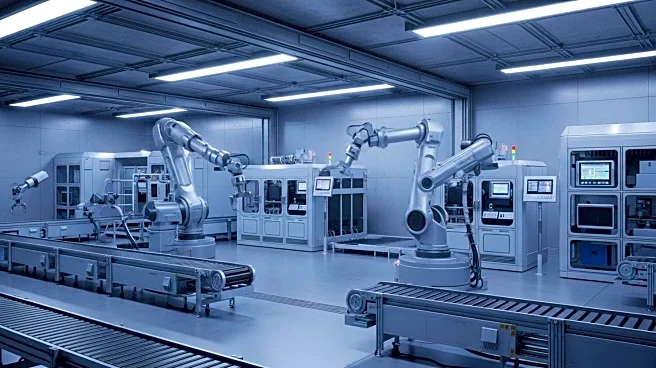What is the story about?
What's Happening?
The manufacturing industry is undergoing significant changes that are expected to reshape sales strategies by 2030. Key trends include the rise of algorithmic sales, regional supply chain networks, long-term partnership models, the increasing importance of sustainability, and the shift towards more flexible production capabilities. AI-driven sales algorithms are enhancing deal strategies by providing predictive insights, while regional sourcing is becoming a priority due to risks associated with global supply chains. Additionally, manufacturers are moving towards outcome-based contracts, emphasizing long-term relationships over one-off sales. Sustainability is climbing the buyer's priority list, with carbon data becoming a critical evaluation criterion. Lastly, advancements in robotics and AI are enabling more agile production processes.
Why It's Important?
These trends are reshaping the competitive landscape in manufacturing, with significant implications for sales teams. The integration of AI in sales processes allows for more accurate predictions and strategic decision-making, giving an edge to teams that can effectively leverage these technologies. The shift towards regional supply chains and sustainability reflects broader economic and environmental pressures, influencing procurement decisions and market competitiveness. Manufacturers that adapt to these changes by emphasizing local sourcing, sustainability, and flexible production will be better positioned to meet evolving customer demands and secure high-margin contracts.
What's Next?
Sales teams need to prepare for these shifts by integrating sustainability into their value propositions and embracing AI-driven insights. As carbon reporting rules become more widespread, the ability to present credible sustainability information will be crucial. Additionally, manufacturers should focus on building regional networks and enhancing production flexibility to meet the growing demand for local sourcing and rapid response capabilities. Those who adapt early to these trends will likely gain a competitive advantage in the evolving manufacturing landscape.
Beyond the Headlines
The move towards more sustainable and flexible manufacturing practices reflects a broader societal shift towards environmental responsibility and resilience. This transformation is not only about meeting regulatory requirements but also about aligning with consumer values and expectations. As these trends gain momentum, they could lead to significant changes in how manufacturing companies operate and compete globally.

















